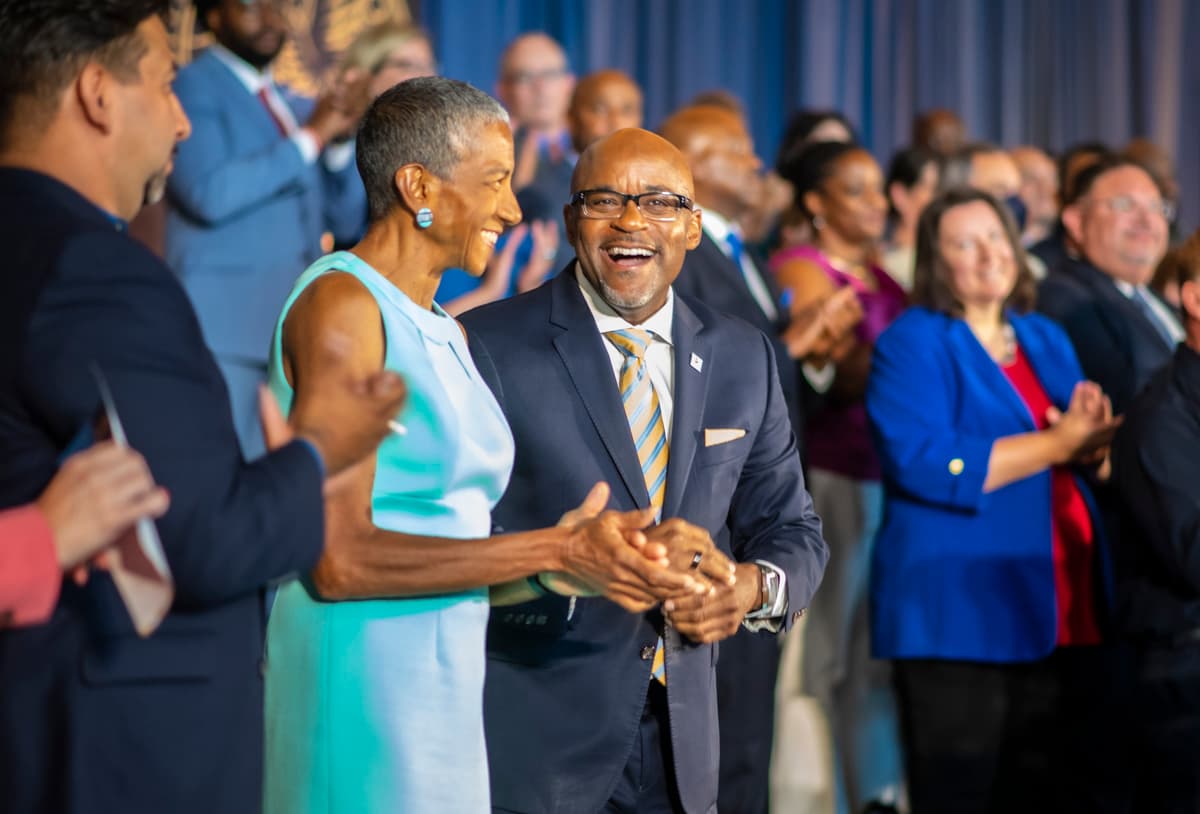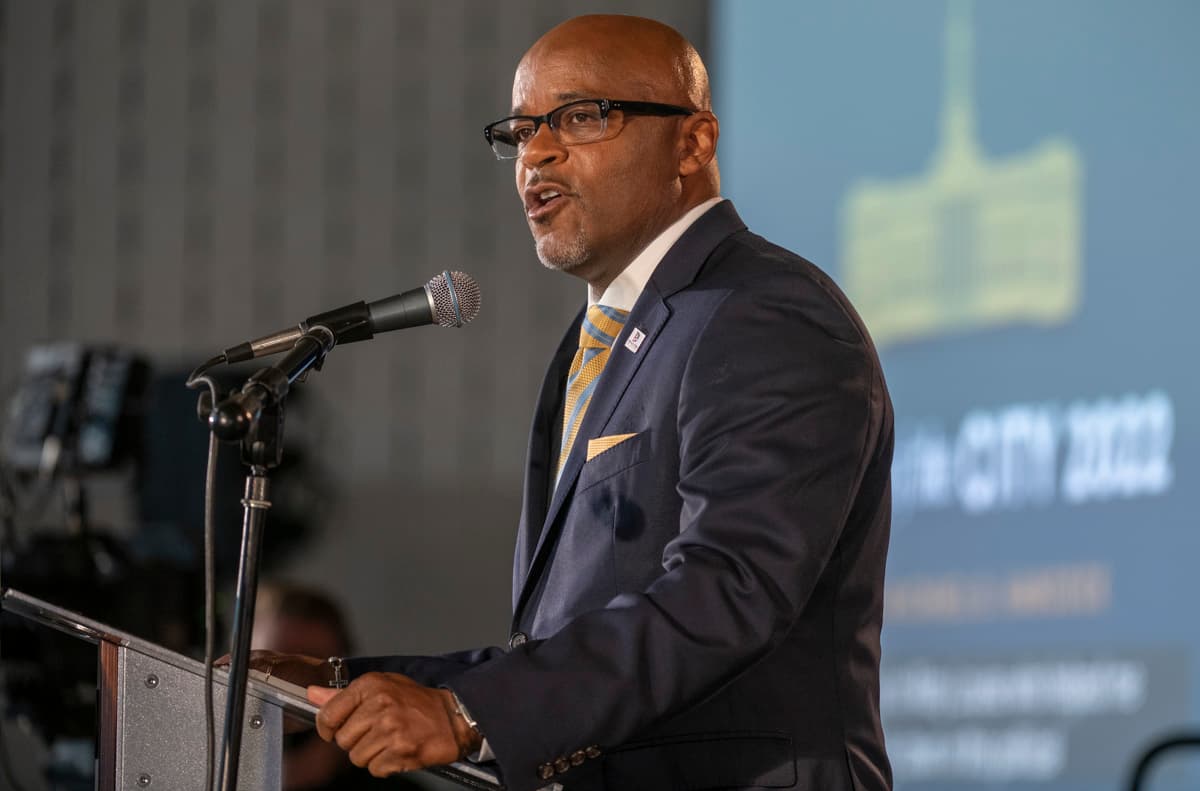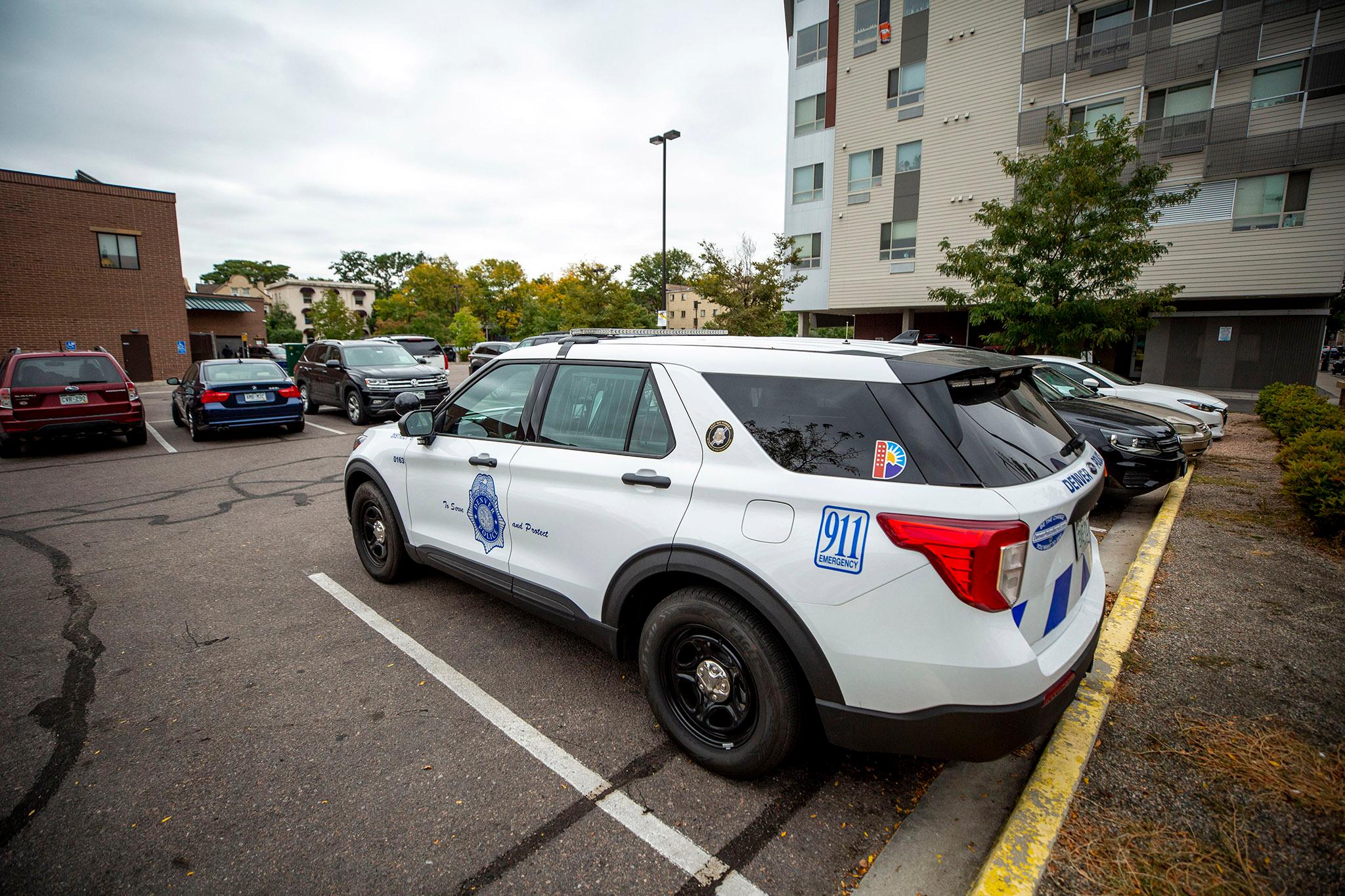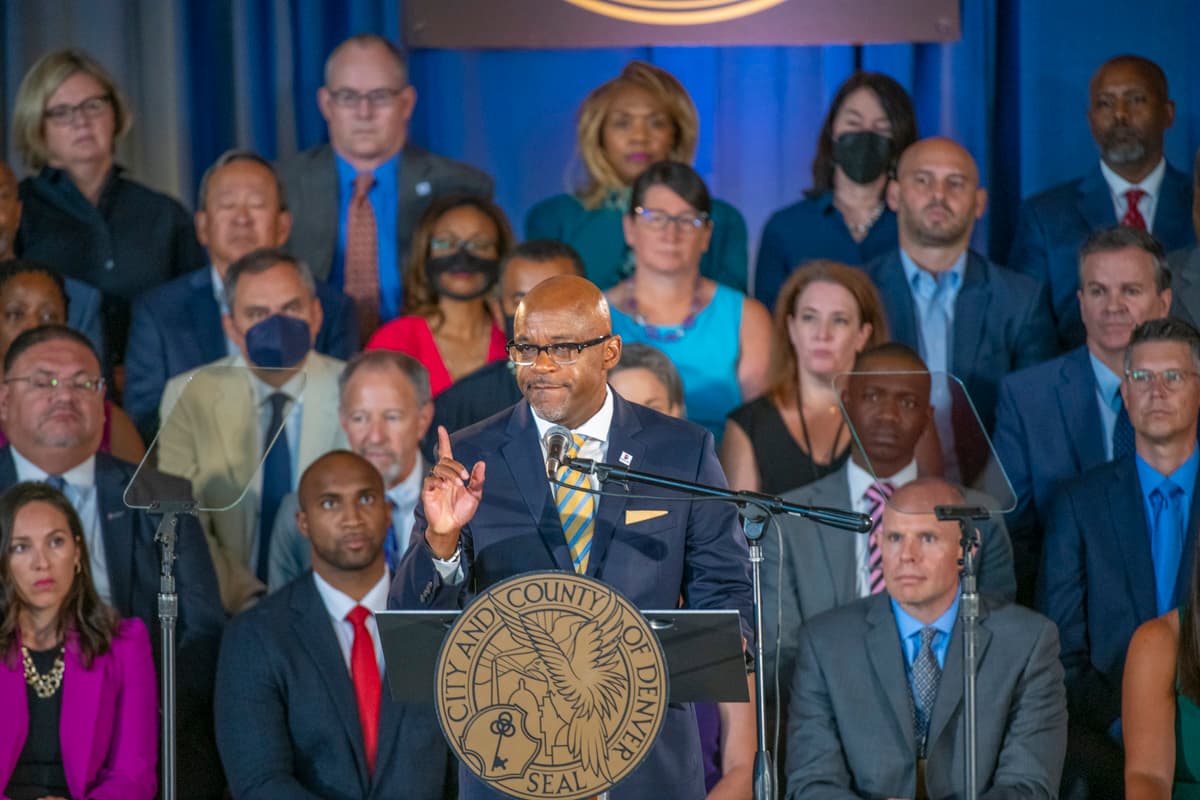The Denver Municipal Band played "Cruella De Vil" as a who's who of Colorado lawmakers, city officials and diligent residents gathered in the gym at the Montbello Recreation Center to listen to Mayor Michael Hancock's last State of the City address Monday morning.
The mood was upbeat.
"I think ... Mayor Hancock has been doing really good," said Trinena Watson, a Montbello resident. "It's real quiet around town and everything. And I know he has a lot to do with that. So basically, everything that I think of, it is just wonderful. It's fine. I think he's doing a good job."
She does wish he spent more time acknowledging the latest variant of COVID-19, which too many people are ignoring, she said.
Brian Loma, who was flyering in front of the rec center as people walked in, reflected on Hancock's legacy, which "has left me wondering what's going to happen to people as housing prices keep skyrocketing, and more and more people end up on the streets in our communities. Under the Hancock administration, you know, we've gone toward a lot of efforts toward environmental responsibility and sustainability. But access to things like bathrooms and water are definitely a concern for me."
Loma hopes the administration, in its last year, quits pushing unhoused people from one encampment to the next and instead finds long-term housing for all.
When it came time for Denver's mayor to walk into the gym, the Black Lives Matter protest band and buskers extraordinaire, the Brothers of Brass, led the way.
That band -- which has found itself in endless trouble with the city during Hancock's time in office for violating noise ordinances and leading protests against the police murder of George Floyd -- was a surprising presence. The City of Denver has paid out millions of dollars in excessive force lawsuits in Hancock's years in office, and the band has not just been a critic of such use of force, but also Hancock's urban camping ban, which criminalizes unsheltered homelessness.
For the administration, the Brothers of Brass was a politic pick, if not a surreal one, sending the message: Even vocal critics are welcome as part of Hancock's Denver -- a point he needs to make as he firms up his legacy.
One vocal critic, District 9 City Councilmember Candi CdeBaca, opted not to show up at all and instead met with students working on a "conscious and woke" production of "The Wiz" in which Dorothy, from Montbello, journeys through Denver to get to the Emerald City -- Aurora.
"I have been to several [State of the City speeches] under this regime," she told Denverite. "I found it more necessary to spend my morning discussing ideas and solutions with the actual future of this city -- our youth -- rather than listening passively to an overblown and inaccurate retrospective of the past 12 years that have brought us to the current multiple intersecting crises facing our city."

© Evan Semón Photography
The timing for a legacy-cementing speech was rough.
Hancock's final State of the City was delivered after a weekend when Denver police unloaded their clips at a man who allegedly pointed a gun at them after last call in LoDo. Officers shot and critically wounded the suspect and also hit at least five bystanders with bullets, shrapnel or other debris, sending them to the hospital. The incident, along with two police killings over the past week, renewed concerns about excessive force, gun violence and whether armed Denver police, under Hancock's leadership, make the public safer or endanger people.
Hancock never mentioned the incident.
CdeBaca, who watched a recording of the speech shortly after, said, "I fell right into the Twilight Zone where he was talking about police...and not a single mention of this weekend."
Police shooting residents is far from the only issue plaguing the city, even if it's the latest to make headlines.
Home prices have skyrocketed during Hancock's time in office, though the market might finally be cooling. Homelessness has risen, encampments have spread, violent crime has spiked, overdoses have increased and wildfires have ravaged air-quality and threatened homes and businesses regionwide.
"These last years have tested us," he said. "A pandemic, economic crisis, historic unrest on our streets and even a failed insurrection in our nation's capital."
Yet Hancock, a talented politician who knows how to pull heartstrings and deviate from script at all the right times, was at his most charming as he attempted to cement his legacy.
He celebrated his family, including his children, who were who pre-teens when he first ran for office over a decade ago and who have all now graduated from college. "Yes, I'm broke," he joked. (Though, just imagine how Denverites putting their kids through college on less than his $184,165 salary are feeling.)
He also paid tribute to former Denver First Lady Mary Louise Lee, with whom he separated in April of 2021. And with tears in his eyes, he honored his mother, who sat in the crowd.
Hancock spoke about his early years in office and lifting Denver's economy out of the Great Recession. He quickly noted that much of that recovery work was undermined by the pandemic and dedicated most of the speech to explaining how the city is bouncing back again.
"Our recovery is strong," he said. "We're moving forward - with our eyes set firmly on a city built on justice."
He framed the entire speech through the lens of justice, evoking the legacy of Martin Luther King, Jr.
"Justice in all its forms has been delayed for far too long for far too many people," Hancock said. "You know, the pandemic laid those injustices bare - deep, terrible, societal wounds. Correcting those injustices has been my pursuit...has been the pursuit of my time in public life. That purpose has been met by our residents who have never faltered in the face of crisis, who demanded better of us, and who worked alongside us to achieve great things. The people of Denver are always the catalyst of our resurgence."
He spoke against divisive rhetoric that splits communities along lines of class, race, religion and sexual orientation and argued the city should find strength in its diversity. He decried the Supreme Court's roll-back of Roe v. Wade and commended Gov. Jared Polis and the legislature for codifying the right to abortion, though Hancock opted not to use the word.
In a plea for people to come together, he said, "Our voices must be as unified and spirited as they are at a Broncos or Avalanche championship parade. Our aim must stay fixed on that pursuit of justice because we are all Denver, and we must remain united for the common good."
Hancock touted economic fairness and the importance of making Denver competitive globally.
"We must continue to demonstrate our commitment to equity and justice by putting our money where our hearts lie," he said. "We've done just that when it comes to housing. When affordability is out of reach, that's not justice. Housing justice is economic justice."
Hancock made his case for how his administration has addressed homelessness.
"Since I took office in 2011, we've housed more than 13,000 of our homeless neighbors," he said. "Let me repeat that for those in the back. Since 2011, we have housed more than 13,000 people. That's 1,181 people for every year. We've created or preserved 9,000 affordable homes and delivered hundreds of permanent supportive housing units. We've expanded our shelter system to operate year-round. Tiny homes and safe outdoor spaces are now proven successful transition programs. More affordable housing is now required in new residential projects. And we are encouraging the conversion of vacant downtown office space into housing."
Despite that, homelessness has risen. In the metro area, 32,233 people received services related to homelessness between July 1, 2020, and June 30, 2021, according to the Metro Denver Homelessness Initiative annual report. According to the same report, in 2021, 10,870 adults, 1,031 members of families, and 954 youth -- a total of 12,855 -- who were living without shelter received services.
The work on addressing homelessness is far from over and far from simple, Hancock said, and he acknowledged, "What we are seeing on our streets is an unjust humanitarian crisis."
He announced he would push City Council to invest $2 million in federal COVID emergency funds to pay for the new Denver Basic Income Project, which would give more than 140 women and families in shelters $1,000 a month for a year in cash to help them find housing stability and to open shelter space for others.
"We're now committing more than $240 million every year to resolve episodes of homelessness, to deliver more affordable housing and to put homeownership within reach for more and more families," he said.

© Evan Semón Photography
Hancock also promoted his down payment assistance program for people pushed out of the city by racist practices like redlining.
He pledged to expand this effort and others to stop displacement and encourage home ownership in communities of color.
He's also launching an equity-focused business investment fund to ensure people of color have the same access to entrepreneurial opportunities as others. The city plans to open a center to support entrepreneurs of color in Northeast Park Hill.
Through rent, utility and eviction assistance and property-tax rebates, the administration is attempting to address the rising cost of living.
He also boasted that Denver has seen enormous economic success in his time in office, including a rise in foreign direct investment, more employers and global businesses moving to the region, and greater international traffic at Denver International Airport.
Hancock acknowledged the severity of the climate crisis and argued the city needed to commit to climate action.
He celebrated the voter-approved Climate Protection Fund, which has funded low-cost community solar power at schools and for low-income families, tree planting efforts and rebates for the installation of electric heating systems and e-bikes, along with micro-transit solutions in Montbello.
And he boosted restoration efforts on the South Platte River, including the removal of hundreds of homes from the flood plains. He did not mention the massive River Mile development, which has sparked some of these restoration efforts, and which will bring 15,000 new residents downtown, many of whom will live in apartment and condo buildings built in the floodplains.

Public safety was a major issue in the speech, and he argued for better policing, though he did not mention the recent incidents of excessive force.
He described himself as a "strong and consistent advocate for reform." As evidence, he cited requirements that officers wear cameras on their bodies, new use-of-force policies and de-escalation tactics incorporated into the Denver Police Department.
He also praised police officers and noted some of the ways they're working to be better at their jobs.
"The Denver Police Department has tripled the number of hours of continuing education over what is required," he said. "They've implemented new training to support de-escalation tactics. Both the police and sheriff departments have adopted enhanced peer intervention practices. And DPD has contracted with a nationally recognized civilian expert to review and elevate training courses."
Hancock pointed to the STAR program, which redirects some emergency calls from armed officers to public-health responders, and said the city's Assessment, Intake and Diversion Center will soon open. The facility, he said, would be an alternative to jail and connect people to addiction treatment and behavioral health resources.
The 2020 George Floyd protests continued to shape his message. He updated the public on the Denver Institute of Racial Equity, Innovation and Reconciliation, which he announced after the demonstrations.
"This institute will promote research around racism, bias, inclusion, and practices of reconciliation, as well as the development of programs and trainings for law enforcement and the public, private and education sectors," he said. "I'm proud to announce the organization has officially been established, the board has been formed and stakeholder meetings are being conducted to further develop the program and funding strategies."
He also addressed the spike in violent crime in the city and the damaged sense of safety. He plans to continue to hire more cops and noted that the department has reduced violent crime in four out of five places it has designated as hotspots.
Hancock explained how he's working to end gun violence. He discussed how the city banned ghost guns and the right for permit holders to carry concealed firearms in parks and city buildings. He noted Denver police took almost 2,100 guns off the streets last year and 1,200 this year. He also pushed Congress to pass an assault weapons ban.
He addressed the opioid crisis, noting fentanyl deaths have quadrupled since 2019. He argued the new state legislation would help stop the crisis, though he also described the policy as "imperfect."
He plans to use the first $8 million that will come to Denver from a national opioid settlement to fund service providers and treatment programs, expand services and increase the availability of counseling and medicated aided treatment. He also described the sheriff's department's efforts to provide released inmates with the opioid-reversal drug Narcan, test strips and treatment contacts.
He celebrated how Denver invests in children -- making a strong distinction between what Denver Public Schools oversees and what his office does.
He mentioned the success of the voter-approved Denver Preschool Program and the Prosperity Denver Fund, which helps students who want to get into college go. He pointed to the MY Denver Card program, after-school meals programs and summer youth employment programs, free RTD summer rides for young people, and the city's participation in former President Barack Obama's the My Brother's Keeper mentorship program.
Denver recently opened a Youth Empowerment Center and by 2024 plans to open four more, he said, also nodding to after-school programs at community centers citywide.
His speech ended on a positive note, looking back at the All-Star Game and the Avs victory and toward the Cities Summit of the Americas as examples of how Denver is growing on the world stage.
"As an administration accountable to the people we serve, we remain committed to justice," he said. "We remain committed to leaving this city better than we found it. And while this may be my final year as mayor, I pledge to you that I will bring the same energy, creativity and intention as if it were my first. A city is a constant work in progress. We build on the progress that came before us. We change. We re-invent. We try new things. And that work is never done."
After prayers from Christian ministers, the Brothers of Brass led Hancock and fellow elected officials including Clerk and Recorder Paul Lopez and District Attorney Beth McCann out of the building, where the musicians blasted brass music and city officials picnicked, hobnobbed and weighed their boss's legacy.











